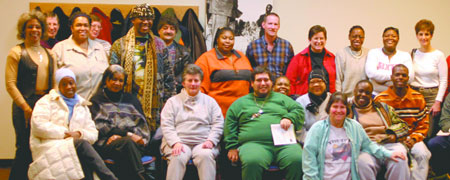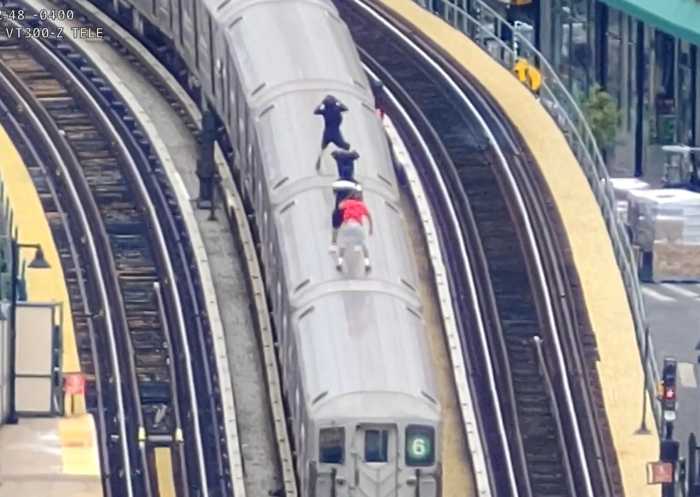Organization commits its resolve and resources to the families and community of slain lesbians
The Newark Pride Alliance (NPA), a lesbian, gay, bisexual and transgender rights group in New Jersey, hosted a meeting at the Paul Robeson Center at Rutgers University at which Parents and Friends of Lesbians and Gays (PFLAG), a nationwide support group for the families and supporters of LGBT people, founded its 501 chapter.
Amina Baraka and LaTona Gunn, mothers of two lesbians who were murdered in New Jersey during 2003, volunteered to serve as the new PFLAG chapter chairpersons.
Both women have become outspoken advocates of the rights of LGBT people and regularly appear at anti-violence rallies and community meetings.
Currently, Richard McCullough is on trial for the May 11 murder of Sakia Gunn, the 15-year-old daughter of LaTona, who was stabbed to death after she identified herself as a lesbian.
Last August, Shani Baraka, a Newark public school teacher, and Rayshon Holmes, her girlfriend, were gunned down in the Piscataway apartment of Shani’s sister, Wanda Pasha.
Suspicion immediately centered on Richard Coleman, also known as Ibn El-Amin Pasha, the estranged husband of Wanda, whom police were searching for at the time because of a restraining order violation.
Law enforcement authorities have Coleman in custody, although he is not charged with the murders of Shani Baraka or Rayshon Holmes.
Amina Baraka said that prosecutors keep her family apprised of an ongoing investigation into the women’s deaths.
Maple Flagg, the mother of a lesbian, and a founding member of a Detroit PFLAG chapter known as Family Reunion—for its emphasis on outreach to the African American community—helped facilitate Saturday’s meeting with Laquetta Nelson, a founding member of NPA, and a long-term lesbian activist in New Jersey.
Ron Schlittler, a director of policy and field operation from PFLAG’s Washington, D.C. headquarters, spoke of the organization’s commitment to its Families of Color Network and the importance of establishing a large chapter in Newark, New Jersey’s largest city.
Flagg’s daughter came out to her in 1997, during Army service in Germany. Flagg shared that her daughter revealed she was in an abusive relationship with another woman. “My first concern was not that my daughter was a lesbian, but that she get out of that relationship,” said Flagg.
Afterwards, when discomfort with her daughter’s sexual orientation began to surface, Flagg attended her first PFLAG meeting. “I felt like a fly in buttermilk,” she said, referring to the all-white group that greeted her. “Blacks just don’t share openly in front of whites,” she said. “If I had walked into a group that looked like this one,” she added, “I might have felt differently.”
Several PFLAG chapter leaders from northern New Jersey and Bergen County attended Saturday’s meeting. These women pledged to assist the Newark chapter in its new recruitment and organizational tasks.
Various public officials also spoke at the event, many of whom work in the civil rights departments of various entities. Charlie McKenna, a spokesman for U.S. Attorney Christopher Christie in Newark, pledged the support of his office in investigating crimes motivated by hatred for a victim’s sexual orientation. McKenna acknowledged that federal law does not include sexual orientation as a category in hate crime prosecutions, but he indicated that his office has the resources and manpower to coordinate with local law enforcement personnel.
Adolph St. Arromand leads Project WOW, a group that does outreach with young gay and transgender African American men, many of whom face educational and health issues because of their sexual orientation. St. Arromand reported that his clients are routinely harassed and beaten, including a 17-year-old transgender boy who was recently attacked and robbed on a Newark street corner.
Dave D’Amico, who is gay, is a detective on the bias crimes unit in Monmouth County. He is also the past president of the Gay Officers Action League, a New York-based advocacy group for LGBT law enforcement personnel in the metropolitan area. D’Amico also pledged to coordinate with Newark activists in putting pressure on elected officials and school administrators to enforce state laws passed to protect LGBT youth.
With the exception of non-profit groups like Project WOW and some limited outreach efforts provided by Liberation in Truth clergy members, who are gay and lesbian, no outreach or social service facilities exist for Newark’s adolescent LGBT population.
The crisis of the city’s LGBT youth came to the attention of adult activists following the death of Sakia Gunn, when thousands of young lesbians took to the streets of Newark and rallied in front of City Hall demanding increased police protection and tolerance for LGBT youth in the city’s high schools.
At Gunn’s funeral, Mayor Sharpe James, surrounded by hundreds of gay and lesbian youth, promised to establish a teen center for the city’s LGBT youth. However, James has refused to meet with LGBT leaders and open a center.
NPA’s Nelson announced that her organization intends to apply for grants and non-city funding to move ahead and initiate the center’s founding.
James Credle, a dean at Rutgers, and NPA’s co-founder, remarked that Saturday was an historic day and noted that the meeting was taking place in a building— named after Paul Robeson, the noted author and civil rights activist—located on Dr. Martin Luther King, Jr. Blvd., named for the slain civil rights leader and Nobel Peace Prize winner.
In conjunction with the launching of PFLAG’s Newark chapter, the organization has established a Sakia Gunn Scholarship for Gay, Lesbian, Bisexual or Transgender Community Involvement, a $2,500 annual award open to an LGBT or straight student active in raising local community awareness about the needs of LGBT youth.
In a follow-up interview, David Tseng, PFLAG’s executive director, said that his organization is committed to incorporating families of color into the nationwide network he leads. He also spoke of the ongoing need to educate Newark’s public officials about the needs of the city’s LGBT community. “We are not about getting in there for a day and getting out. We are in Newark for a long-term commitment.”



































